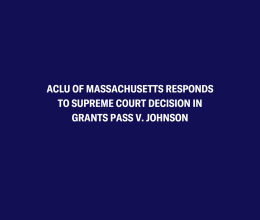
Victory! Police in Massachusetts must get a warrant to access patient data
By Kade Crockford, director of the ACLU of Massachusetts' Technology for Liberty Project.
Today, Governor Baker signed a sweeping opioid bill, expanding access to the overdose-reversing drug naxolone and to medication assisted treatment for people suffering with opioid-related substance use disorders, including for people locked up in Massachusetts jails and prisons. Importantly, thanks to the lobbying efforts of public health experts and the ACLU, the law does not include authorization the Governor sought for judges to commit people to facilities against their will.
Those provisions of the new law have received loads of media attention. But there’s a hidden gem in the law that you probably haven’t heard about.
In a huge victory for patient privacy, the opioid legislation imposes a warrant requirement for law enforcement access to medical records stored in the state Department of Public Health’s prescription monitoring database. Massachusetts now joins over a dozen other states in requiring that police and prosecutors get warrants before digging around in sensitive patient information.
Before this reform, the law in Massachusetts allowed police and prosecutors to rifle around in patient medical records without any judicial oversight whatsoever. The result? Astonishing numbers of law enforcement searches of patient medical records.
Information obtained by the ACLU through a public records request reveals that over a period of less than two years, between August 2016 and March 2018, enforcement entities accessed patient records without warrants nearly 11,000 times—or about 20 times per day.
Politicians and even law enforcement officials acknowledge that substance use disorders are public health problems that won’t be solved by the criminal legal system. But our policy doesn’t yet reflect that reality. Across Massachusetts, police continue to arrest people for drug possession, and prosecutors continue to send people to jail merely because they are struggling with addiction.
That’s not right. Thankfully, the state legislature has moved us in the right direction by requiring law enforcement get warrants before demanding patient records, bringing us one step closer to removing police, prosecutors, and prisons from our response to substance use issues altogether.
UPDATE, January 2019:
Just weeks after securing this important victory, prosecutors succeeded in overturning it by securing an amendment to the supplemental budget that included a carve-out to the warrant requirement for District Attorneys. Thankfully, Governor Baker rejected that amendment, and the ACLU worked to secure a compromise that is a huge improvement over the previous status-quo, under which police, prosecutors, and federal agents could obtain our prescriber information without any judicial oversight or probable cause. The compromise amendment, which Governor Baker signed into law this week, requires that law enforcement obtain warrants to access records in the prescription drug monitoring database, except in cases where someone has died of an overdose—and in those cases, prosecutors are only allowed warrantless access to the records of the person who died.
Note: Chart does not contain all law enforcement searches during this period. View a larger version of the chart here.
Related content


ACLU of Massachusetts statement on US Department of Justice report...
December 9, 2024
ACLU of Massachusetts calls for urgent federal investigation into...
September 20, 2024
ACLU of Massachusetts responds to Supreme Court decision in Grants...
June 28, 2024
Massachusetts for Overdose Prevention Centers comment on new VT law...
June 18, 2024
Wrongful death lawsuit against Boston, four police officers can now...
May 16, 2024
ACLU applauds new landmark data privacy legislation
May 6, 2024
Labor unions in Massachusetts join MA4OPC Coalition to support...
April 4, 2024